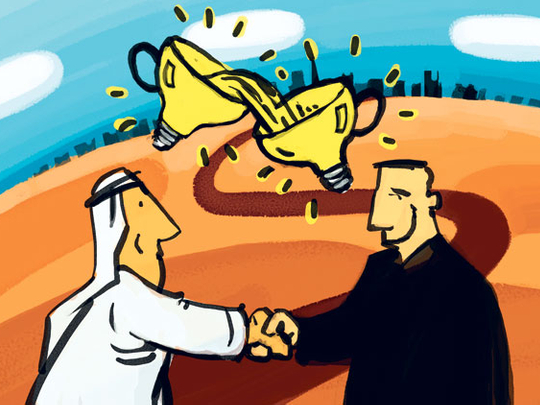
The ancients who walked the Silk Road navigated vast distances and risked their lives to transport the most coveted materials of the day. They followed not roads or sign posts, but an array of arteries marked by mountains, seas and stars. In facilitating this trade, these civilisations shared far more than resources — they shared ideas, innovations and philosophies.
Today, silk and spices don't drive economies, but ideas do. As we look at modern trade, it is clear a new virtual Silk Road connects the world and, like the Silk Road of old, its routes are clearly delineated by leading economic powers, from the USA, to Europe and onwards to China and Japan.
Singapore, Finland, and Korea are some of the notable recent additions to this path, having transformed their economies to thrive on the trade of knowledge and ideas in just one generation. These are nations that lead in innovation, which bring the philosophy of science, technology and innovation to the core of their economies and whose new ideas drive trade and progress and global competitive advantage while advancing their societies at the same time.
Abu Dhabi is well situated to join this new route and possesses the clear vision and commitment to drive economic diversification, but understanding how it can join this new virtual Silk Road requires deeper insight. Such progress necessitates a careful assessment of the complex and diverse enabling factors at the heart of modern economic transformation.
So why, in a global knowledge-driven marketplace, have a select few grown into such dominant economic forces that their very presence delineates the lines of modern trade? One commonality is clear: these economies have dedicated policies, strategies and plans to develop science, technology and innovation as a core part of their domestic product and way of life.
Human capital is vital
A closer examination reveals five key areas consistently linked to success across all these plans: human capital, research and development, enterprise development, infrastructure and laws and regulations.
A knowledge-centric economy begins and ends with a skilled workforce. The development of human capital at all skill levels is vital, from raising the standards of education in science, technology, engineering and mathematics (STEM) in the emirate's schools, to the provision of appropriate skills training. While some nations, like Singapore, excelled at recruiting the best talent from around the world to make up for its deficit in human capital, other nations, such as Korea, stood apart in their ability to generate domestic talent by beefing up their education system to take advantage of a sizable population.
Research and Development (R&D) is the key change agent creating and translating new knowledge into true market value. Lessons from other economies show that focused government investment in R&D can act as a strong catalyst to speed-up market performance. Public sector budgets underpin universities, build labs and catalyse investment by the private sector that in turn creates new jobs and wealth. Singapore, through direct government investment in R&D in what it identified as its technology areas of focus, currently boasts world-class R&D in biomedical engineering and information and communications technology.
Capitalising on these valuable ideas requires a solid enterprise base. Such a base is defined not by the size or number of companies in an economy, but by the careful balance of large enterprises supported by a flexible and innovative base of small and medium enterprises. Some countries focus most on organic growth of new enterprises, such as Taiwan, while others like Singapore focused on attracting large multinationals to set up and drive growth in the supporting enterprise base. Most countries create more than just a business landscape; they nurture an enhanced culture of entrepreneurship and excellence.
Attractive infrastructure
Of course, businesses need infrastructure and effective channels through which they communicate. Growing a modern economy means investing in high-tech and high-quality infrastructure. This does not just mean fibre optic cables and roads, but also schools, hospitals, and housing that form the attractive social infrastructure for the international community.
Finally, a comprehensive legal ecosystem is needed to encourage the constant development of innovative ideas. This includes business-friendly labour laws, regulations that make it easy to operate companies, and a strong Intellectual Property regime that supports the creation and protection of ideas. Finland, a leading innovator, is a perfect example as it hosts one of the best IP ecosystems in the world with comprehensive laws that are uniformly enforced, an administration system that minimises bureaucracy, and organisations that actively encourage companies to protect and utilise their ideas. It is clear each economy that pursued advancement in these five areas took a bespoke approach. In every case, policies were tailored to address a nation's unique socioeconomic strengths, weaknesses and opportunities.
By tailoring these five policy areas to Abu Dhabi's unique needs, the emirate will follow a proven route to develop a knowledge-based economy. Through science, technology, and innovation Abu Dhabi can ensure the virtual Silk Road of tomorrow does not just flow through the emirate, but will be supported by the ideas and innovations of its future generations.
The writer is Director-General, Abu Dhabi Technology Development Committee.












